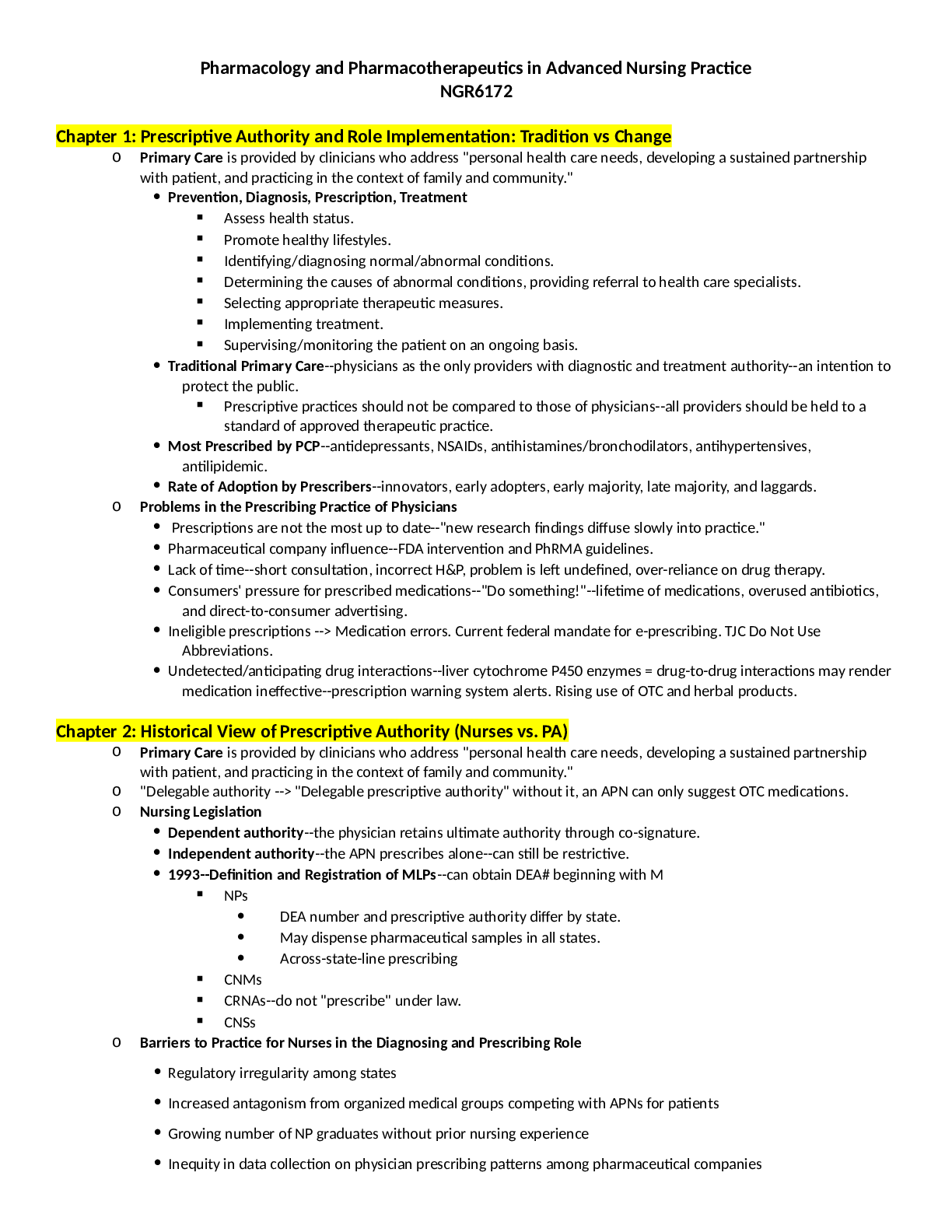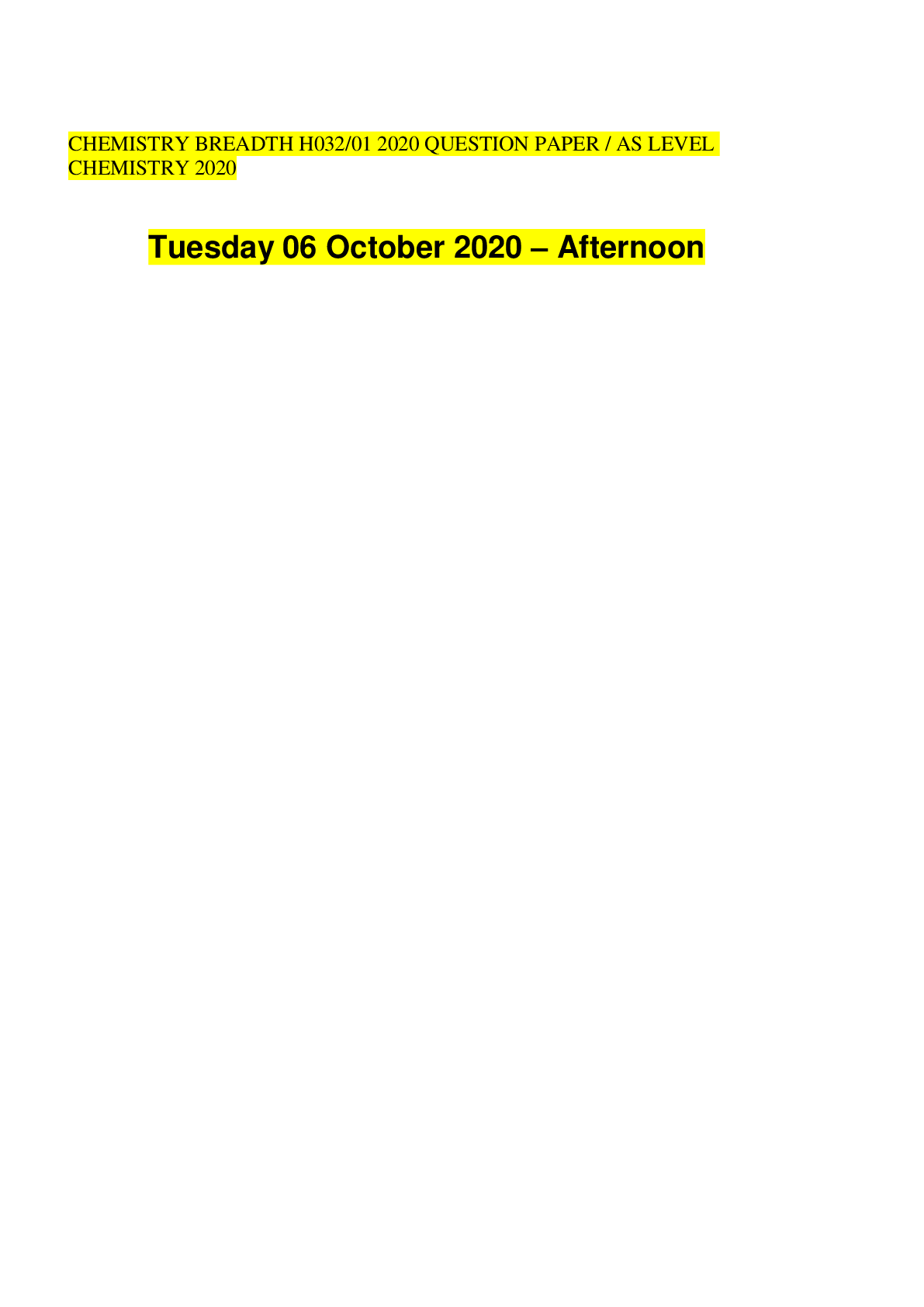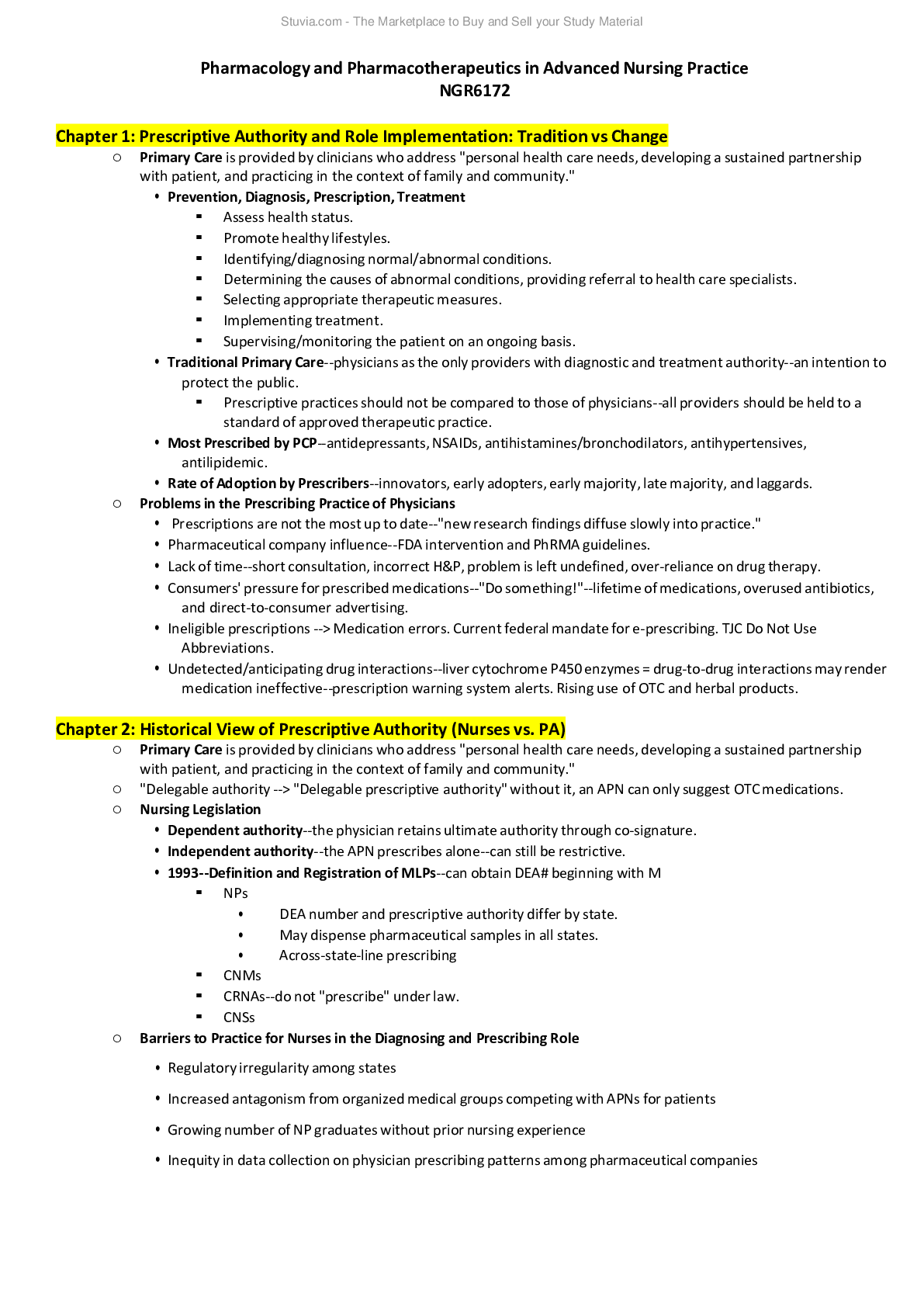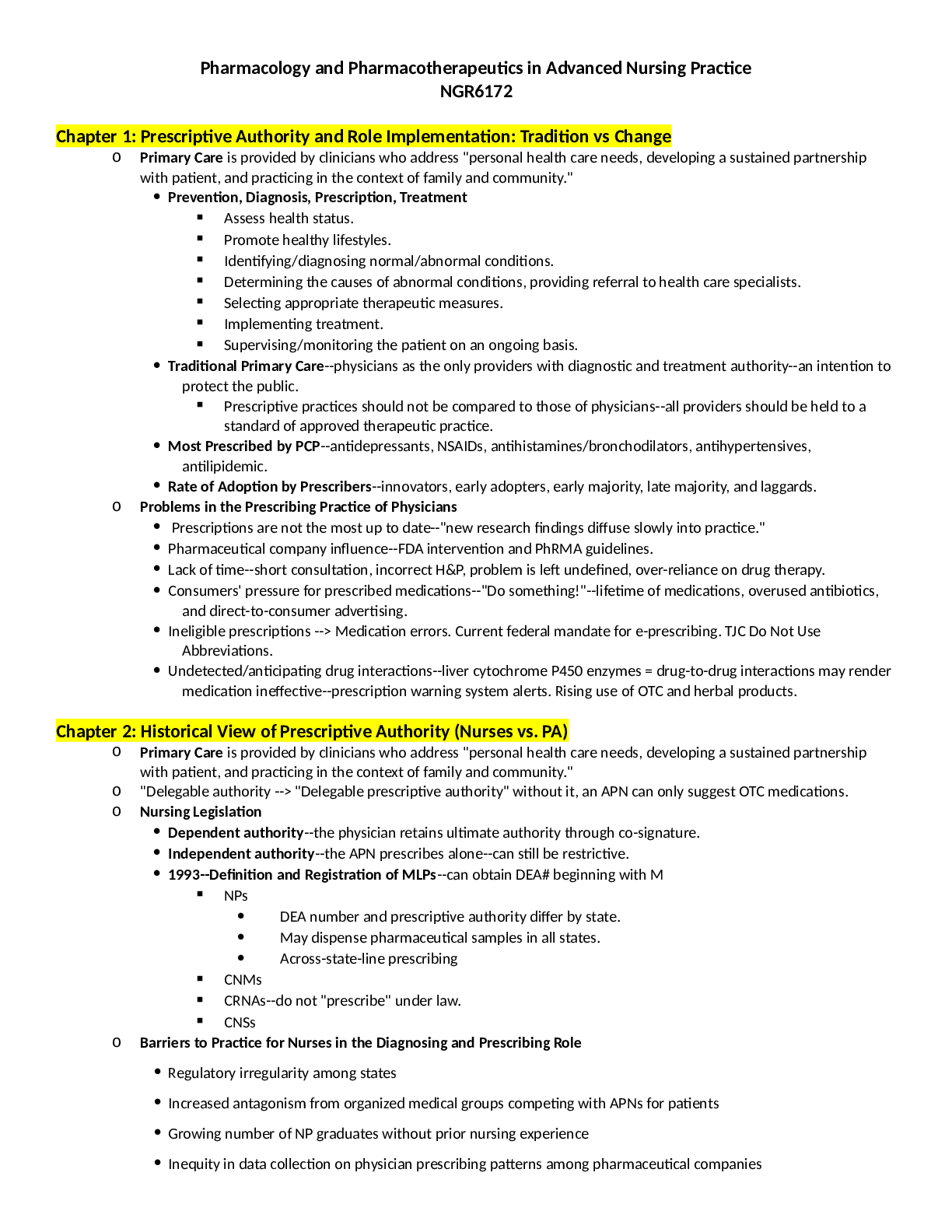Pharmacology > STUDY GUIDE > Pharmacology and Pharmacotherapeutics in Advanced Nursing Practice NGR6172 (All)
Pharmacology and Pharmacotherapeutics in Advanced Nursing Practice NGR6172
Document Content and Description Below
Pharmacology and Pharmacotherapeutics in Advanced Nursing Practice NGR6172 Chapter 1: Prescriptive Authority and Role Implementation: Tradition vs Change o Primary Care is provided by clinicians wh... o address "personal health care needs, developing a sustained partnership with patient, and practicing in the context of family and community." Prevention, Diagnosis, Prescription, Treatment Assess health status. Promote healthy lifestyles. Identifying/diagnosing normal/abnormal conditions. Determining the causes of abnormal conditions, providing referral to health care specialists. Selecting appropriate therapeutic measures. Implementing treatment. Supervising/monitoring the patient on an ongoing basis. Traditional Primary Care--physicians as the only providers with diagnostic and treatment authority--an intention to protect the public. Prescriptive practices should not be compared to those of physicians--all providers should be held to a standard of approved therapeutic practice. Most Prescribed by PCP--antidepressants, NSAIDs, antihistamines/bronchodilators, antihypertensives, antilipidemic. Rate of Adoption by Prescribers--innovators, early adopters, early majority, late majority, and laggards. o Problems in the Prescribing Practice of Physicians Prescriptions are not the most up to date--"new research findings diffuse slowly into practice." Pharmaceutical company influence--FDA intervention and PhRMA guidelines. Lack of time--short consultation, incorrect H&P, problem is left undefined, over-reliance on drug therapy. Consumers' pressure for prescribed medications--"Do something!"--lifetime of medications, overused antibiotics, and direct-to-consumer advertising. Ineligible prescriptions --> Medication errors. Current federal mandate for e-prescribing. TJC Do Not Use Abbreviations. Undetected/anticipating drug interactions--liver cytochrome P450 enzymes = drug-to-drug interactions may render medication ineffective--prescription warning system alerts. Rising use of OTC and herbal products. Chapter 2: Historical View of Prescriptive Authority (Nurses vs. PA) o Primary Care is provided by clinicians who address "personal health care needs, developing a sustained partnership with patient, and practicing in the context of family and community." o "Delegable authority --> "Delegable prescriptive authority" without it, an APN can only suggest OTC medications. o Nursing Legislation Dependent authority--the physician retains ultimate authority through co-signature. Independent authority--the APN prescribes alone--can still be restrictive. 1993--Definition and Registration of MLPs--can obtain DEA# beginning with M NPs DEA number and prescriptive authority differ by state. May dispense pharmaceutical samples in all states. Across-state-line prescribing CNMs CRNAs--do not "prescribe" under law. CNSs o Barriers to Practice for Nurses in the Diagnosing and Prescribing Role Regulatory irregularity among states Increased antagonism from organized medical groups competing with APNs for patients Growing number of NP graduates without prior nursing experience Inequity in data collection on physician prescribing patterns among pharmaceutical companies Difficulty in obtaining prescribing data from Prescription Drug Marketing Act Chapter 9: Establishing the Therapeutic Relationship "How scientific principles are introduced in the relationship with the patient has everything to do with therapeutic success." The balance of art and science in healthcare. "A continuing relationship with the healthcare provider is essential in making adjustments to discover the proper therapy for the individual." o Identify a problem, assess it adequately, identify various potential solutions, examine he variables needed to judge the risk/benefit ratio of the solutions, choose the most appropriate solution, and identify the effects (beneficial and adverse) that may result from implementation of the chosen solution. Factors of a Therapeutic Relationship o Time--investment--particularly with the elderly--initial investment to obtain thorough H&P--cost-effective--follow up call strengthen the relationship o Attitude--how time is spent and what is said--"Who owns the problem?" o Information--it may take several visits to obtain a full history o Communication--effective two-way communication between patient and provider requires consistent commitment to respect the others' role in the relationship. Transference Focus on patient, environment, and lastly, self. Find a balance between creating uncontrolled and unfounded anxieties vs creating a false sense of equally grounding security and reassurance. It is implicitly understood that once a problem is presented, the provider will do their utmost to provide the best therapy. The therapeutic objective must be clearly stated--1) must be realistic and attainable, 2) clearly related to the problem as defined and assessed, 3) measurable. Be flexible, accept occasional lapses in compliance, attempt to understand the patient's point of view. o Therapeutic Relationship Fails Skepticism in the medical profession. Provider main goal is pharmacoadherence. Over or under utilization. Therapeutic failure and increase in disease severit [Show More]
Last updated: 2 years ago
Preview 1 out of 53 pages

Buy this document to get the full access instantly
Instant Download Access after purchase
Buy NowInstant download
We Accept:

Reviews( 0 )
$7.50
Can't find what you want? Try our AI powered Search
Document information
Connected school, study & course
About the document
Uploaded On
Apr 13, 2023
Number of pages
53
Written in
Additional information
This document has been written for:
Uploaded
Apr 13, 2023
Downloads
0
Views
68




, All Correct, Download to Score A.png)
 Questions and Answers (latest Update), All Correct, Download to Score A.png)
 Questions and Answers (latest Update), All Correct, Download to Score A.png)



